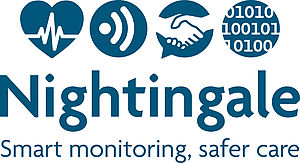The H2020 “Nightingale” project was set up with the goal of radically improving the monitoring of patients at risk of deterioration by means of unobtrusive, wearable sensor systems. To this purpose, a consortium of users from five major hospitals in the Netherlands, Germany, Sweden, Belgium and the United Kingdom launched a “Pre-Commercial Procurement” (PCP) project to stimulate European industry and work with it to build such systems.
Background
In comparison to the ICU, patient monitoring on general wards is conducted in a much less intensive way, with reliability of detection of any problems decreasing further when patients are discharged home, thus increasing the risk that any deterioration in their health is only recognised and acted on with considerable delay. The outcome is avoidable setbacks in patients’ recovery and failure to treat new complications which in the worst case can lead to death.
Objective
Continuous monitoring of patients’ vital signs should enable nursing staff, doctors, or carers at home to recognise any deterioration in patients’ health before irreversible harm occurs.
The proposed systems should be able to continually measure vital parameters (for example, respiratory rate, blood pressure), integrate other key (e.g. biochemical) data and communicate significant abnormalities to the healthcare team.
It should be possible for the devices to be worn permanently on the body without restricting mobility and used for two-way communication so that the patient has the option of being asked about and reporting any concerns.
Results
At the end of 2017, the consortium of users issued a Europe-wide call for tender for the development of innovative solutions, with over 150 manufacturers registering their interest. The project is currently in Phase III.
Phase I: Nine bidders were awarded contracts for the development of design concepts with a deadline of 1 May 2018.
Phase II: To further develop these design concepts into functional models/prototypes, four bidders with the most promising ideas were invited to continue with their work and supported in it. They presented their solutions at the beginning of 2019, and the new products were evaluated in early studies with human volunteers in London and Utrecht.
Phase III: In November 2019, the two bidders with the best performing prototypes were awarded contracts to further develop their solutions and validate them in clinical trials at all five consortium locations during autumn/winter 2020.
